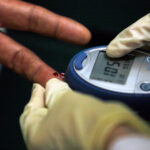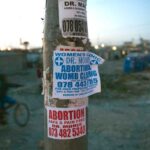Healthcare facilities are working to ensure migrant workers are never far from care.
It is mid-morning in the town of Zalewa in Malawi’s Neno district. A man wobbles unsteadily on his bicycle, which is heavily loaded with sacks of maize. He rides past a mural that reads: “Welcome to Zalewa Clinic.”
Inside the clinic yard a little girl in a black top and blue skirt that barely fits is asleep on one of the concrete steps leading up to the clinic door, seeking refuge from the sun under the scant shade of a small tree.
When it is finally her turn to see the doctor, her father hoists her up and leads her through the crowded doorway.
“We see about 80 patients here [a day],” says William Maliko as he makes a note on the girl’s clinic card. “This is the only clinic around here. The next closest one is about 67km away.”
Outside the cluttered consultation room, men in dress shirts and women with traditional-print material wrapped around their waists, some with babies on their backs, all anxiously await their turn.
But they are not Maliko’s usual clientele. The clinic specialises in HIV counselling, testing and treatment, family planning and treating sexually transmitted infections (STIs).
“Our main targets here are sex workers and long-distance travellers like truck drivers. If they are not around, then we assist the people in the community,” says Maliko, who is in charge of the clinic.
On the move and at risk
Because of the nature of their work, sex workers and truck drivers are at higher risk of HIV infection than the general population.
According to the 2013 Malawi biological and behavioural surveillance survey, 62.7% of female sex workers and about 21% of truck drivers are HIV positive. This is far higher than the estimated 10% of the country’s adults aged 15 to 49 living with HIV, according to the Joint United Nations Programme on HIV and Aids.
Yet people in these population groups often face barriers when accessing sexual and reproductive health services. These obstacles include the working conditions of migrant or seasonal workers who move around a lot, as well as the criminalisation of sex workers and men who have sex with men, and the social discrimination they face.
Opened in 2014, the Zalewa Clinic is part of a project by Doctors Without Borders that provides health services along a busy trade route running through Malawi’s Neno and Mwanza districts, and Tete province in Mozambique.
The project recently expanded to Zimbabwe.
‘I am the same as them’
The clinic tests and provides treatment for tuberculosis, STIs and HIV, and offers general healthcare services. But working with marginalised people like sex workers is difficult because many have had negative experiences with healthcare providers in the past.
Cecilia Khanje, a peer educator at Zalewa, is a sex worker herself. She talks to her peers about sexual and reproductive healthcare and the services they can access at the clinic.
“The girls are comfortable when they see me because they know who I am. I’m the same as them. So they are always open to come to me whenever they have a health issue. Sometimes they even come to my house in the evenings, because they know that I’m in their shoes.”
Khanje follows up on the clinic’s antiretroviral therapy patients to make sure they are still taking their medication correctly and tracks down those who have defaulted on their treatment.
“The biggest challenge is that sex workers move around a lot, and sometimes when someone has to come for a follow-up test they don’t show up. But as I am also a sex worker, I know where to find most of them,” she says.
Most of her patients leave contact numbers with other sex workers. If she cannot find someone immediately, Khanje waits because she knows they will return eventually.
“If they are not here for a month, they can go somewhere else and get their medication. But they always come back for their prescription.”
This clinic is part of a wider network of clinics along the border between Malawi and Mozambique that provide healthcare specifically to sex workers.
“If the patient cannot come back to us for a follow-up [visit] or to refill a prescription, they can go to our office in Mwanza or the clinic at the border. We even have a clinic in Tete in Mozambique,” says Maliko.
Services at the clinic are free and patients are encouraged to get tested for HIV every three months.
“We want to make sure that those who are on treatment do not default — that way, we can avoid issues of treatment failure or resistance. We also want to help those who do not have HIV to avoid infection,” says Maliko.
“By providing health services to sex workers, we are also protecting their clients. For example, someone who is on antiretroviral treatment has a reduced viral load [the amount of HIV in someone’s body] and a minimal chance of transmitting the virus.”
Ina Skosana was a health reporter at Bhekisisa.






